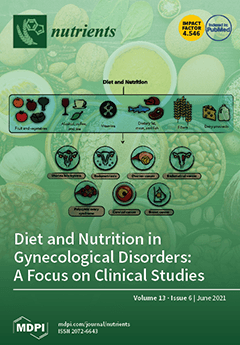Children with inborn errors of intermediary metabolism (IEiM) must follow special diets that restrict their intake of essential nutrients and may compromise normal growth and development. We evaluated body composition, bone mineral density, physical activity, and food intake in IEiM patients undergoing dietary
[...] Read more.
Children with inborn errors of intermediary metabolism (IEiM) must follow special diets that restrict their intake of essential nutrients and may compromise normal growth and development. We evaluated body composition, bone mineral density, physical activity, and food intake in IEiM patients undergoing dietary treatment. IEiM patients (
n = 99) aged 5–19 years and healthy age- and sex-matched controls (
n = 98) were recruited and underwent dual-energy X-ray absorptiometry to evaluate anthropometric characteristics and body composition. Data on food intake and physical activity were also collected using validated questionnaires. The height z-score was significantly lower in IEiM patients than controls (−0.28 vs. 0.15;
p = 0.008), particularly in those with carbohydrate and amino acid metabolism disorders. Significant differences in adiposity were observed between patients and controls for the waist circumference z-score (−0.08 vs. −0.58;
p = 0.005), but not the body mass index z-score (0.56 vs. 0.42;
p = 0.279). IEiM patients had a significantly lower total bone mineral density (BMD) than controls (0.89 vs. 1.6;
p = 0.001) and a higher risk of osteopenia (z-score < −2, 33.3% vs. 20.4%) and osteoporosis (z-score < −2.5, 7.1% vs. 0%), but none presented fractures. There was a significant positive correlation between natural protein intake and BMD. Our results indicate that patients with IEiM undergoing dietary treatment, especially those with amino acid and carbohydrate metabolism disorders, present alterations in body composition, including a reduced height, a tendency towards overweight and obesity, and a reduced BMD.
Full article






